| |
|
|
|
|
|
|
|
|
|
|
| |
| |
田润德
编译文/图 2020-06-23
20:36 |
|
| |
|
|
|
|
| |
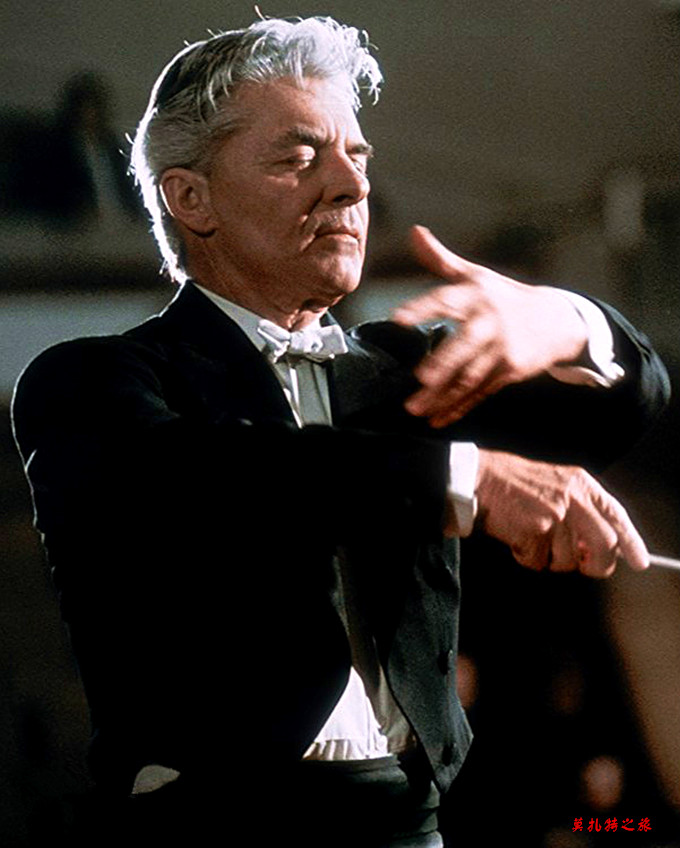 |
|
|
|
| |
赫伯特·冯·卡拉扬(Herbert von
Karajan,1908-1989) |
|
|
|
| |
|
|
|
|
| |
【小提琴】Herbert von Karajan
Memorial Concert - Seiji Ozawa (小泽征尔 - 纪念卡拉扬音乐会) |
|
|
|
| |
赫伯特·冯·卡拉扬纪念音乐会
安苏菲·
小泽征尔
柏林爱乐乐团
贝多芬D大调小提琴管弦协奏曲
D小调第二小提琴独奏巴赫变奏曲:萨拉班德
柴可夫斯基B小调第六交响曲《悲怆》
2008年1月28日,维也纳 |
|
|
|
| |
WolfganHerbert von Karajan Memorial Concert
Anne-Sophie Mutter
Seiji Ozawa
Berliner Philharmoniker
Beethoven Concerto for Violin and Orchestra in D major
Bach Partita for Solo Violin No.2 in D minor: Sarabande
Tchaikovsky Symphony No.6 in B minor "Pathetique"
2008 January 28, Vienna
|
|
|
|
| |
|
|
|
|
| |
音乐历史上的今天
1964年6月23日,赫伯特·冯·卡拉扬辞去了长达八年的维也纳国家歌剧院总监一职后,宣布他再也不会在祖国奥地利工作。
柏林爱乐—冯·卡拉扬临危受命
战后的柏林爱乐几经危机,除了乐队本身需要重建,人员要添补外,首席指挥问题始终需要解决,先是首席指挥里奥·波查德特(Leo
Borchardt)被占领区士兵射杀,后来由年轻的谢尔盖·切利比达奇(Sergiu
Celibidache)短暂接掌。1947年富特文格勒归来,但在种种内外因素的作用下,他要一直待到1952年才下定决心出任乐团首席指挥一职。但此时的富特文格勒已经力不从心。他的耳聋日渐严重,他需要西门子公司为指挥台安装线路设备,以便听到乐队的声音。而且富特文格勒人缘欠佳,与其他指挥的关系都比较紧张。早在1954年11月30日富特文格勒肺炎逝世前,柏林爱乐乐团就要考虑其继任人问题,而候选人都是当时指挥界的能人:克鲁依坦,切利比达奇,约胡姆,舒里希特,还有卡拉扬。
富特文格勒在1948年重返舞台,同时也意味着卡拉扬一直在维也纳,柏林和萨尔茨堡这些音乐重镇之前不得正门而入,加上卡拉扬身系繁忙的任务,所以他只得零星的机会与柏林爱乐乐团接触。
到了1953—54年,卡拉扬与柏林爱乐合作日益频繁,他们不但录制了贝多芬的英雄交响曲,还共同出席节日周音乐会(Festwochenkonzert)。这些演出得到了当时乐评家的热烈赞赏。
经过这短期的磨合,卡拉扬的继任只是时间问题。1954年11月30日富特文格勒逝世,正是柏林爱乐美国之行的前夕。当时卡拉扬正在罗马一所酒店里。他的秘书给他递上一封来自维也纳发出的匿名电报,上书“Le
roi est mort, vive le
roi.”(法语:老王驾崩,新主万岁。)就在第二天,柏林爱乐乐团经理格哈德·冯·韦斯特曼(Gerhart von
Westerman)就立刻打电话给卡拉扬,请后者出任乐团首席指挥一职。韦斯特曼打这个电话可能有多方面的原因,其中之一就是在纽约负责乐团访美事务的有关方面致电他道:除非卡拉扬指挥,否则乐队的旅美之行,免谈。
至于卡拉扬方面,这支乐团正是他日思夜想要拥有的。他曾说:“我一定要得到这支乐团,因为他的素质让我着迷,而且我也知道,和这支乐团一起我将能有什么样成就。我要一份终身合同,理由只有一个:我要在这支乐团身上花很多时间,以求他能与我最终同心同德。我不能让一个新来的议员说着说着就结束我俩的合作关系。我必须承认,这支乐团通过几十年的成长,正是成长为我梦寐以求的样子。”
不过当时他还有斯卡拉的合约在身。为此卡拉扬与他的朋友兼老板吉永高利(Ghiringhelli)进行了一次面谈,后者很清楚柏林爱乐的职位对卡拉扬的意义,很爽快地同意了卡拉扬的跳槽。
另一方面,柏林爱乐乐团的成员也投票通过了对卡拉扬的任命,意味着卡拉扬将带领乐团旅美。不过卡拉扬在这时提出了一个条件,就是任命文书要在出发之前面交到他的手上并且其任命要得到官方确认。
1955年初,这对新组合踏上了前往新大陆的航班。该次出行赞助人就是西德总理阿登纳。不过就在乐团和卡拉扬到达纽约国际机场的前一周,一阵反对的浪潮差一点就扼杀了这一次巡美演出。美国音乐家联盟和“地方802”(Local
802)在2月20日《纽约时报》头版刊登了一篇文章,名曰《音乐家反对纳粹带领的柏林乐团在此举行的音乐会》。其实从2月8日到27日乐团正式在华盛顿拉开访美帷幕这段时间内,纽约时报几乎天天报道反对卡拉扬战时纳粹身份的抗议声音。韦斯特曼在“地方802”文章刊出后一天声明,自己与卡拉扬虽然的确加入过纳粹党,但只是纯粹地为了在当时能继续工作下去。虽然这声明更多的是煽动了反对派的气焰。不过这些反对最终还是未能成功,原因很简单,因为这次巡回是由西德政府出资的。
2月25日乐团抵达美国,一切平静。卡拉扬对此一切只是做了一简短的声明:“我不谈政治,我只是作为一位音乐家来到这里。”卡拉扬与柏林爱乐在接下来的6个星期以其声音打动了美国听众和乐评界。他们分别在华盛顿,纽约卡内基音乐厅,辛辛那提和巴尔的摩等城市演出。乐评总体来说是正面的。而抗议的声音则在纽约演出之时到达高潮,卡内基门外有人抗议,还有人放飞带有反对标语的鸽子。但即使这样,演出的进行也没有受到影响。
这次美国之行,是一次真真正正的试用期。卡拉扬要向三方面交答卷:一是观众和乐评人,二是柏林爱乐乐团,三是西德政府。不但是艺术方面,卡拉扬还必须在道德和政治方面要表现成熟(例如在美国时言行是否得体,是否会被反对声音打压下去),才能显示自己可胜任柏林爱乐首席一职。卡拉扬不负众望,早在3月5日卡拉扬一行还在匹兹堡逗留时,就已传出乐团大部分成员投票赞成卡拉扬成为他们第四任常任指挥的消息。而等到他和乐团返德之后几天,其任命被柏林政府确认。卡拉扬再一次被问道,他是否愿意继承富特文格勒衣钵,带领柏林爱乐乐团。他回答道:“万分欢喜地接受。”于是,柏林爱乐的权杖历经汉斯·冯·彪罗,尼基什和富特文格勒,终于传到卡拉扬手上。
今日视频:1、安妮·索菲·穆特演奏,小泽征尔指挥,《贝多芬小提琴协奏曲》。2、卡拉扬指挥贝多芬《命运
交响曲》。(卡拉扬的一生对贝多芬情有独钟,这是因为他第一次出道指挥的曲目就是贝多芬的歌剧《费德里奥》。
谈到卡拉扬必须介绍的两个人物就是小泽征尔和穆特,一个是受卡拉扬艺术哲学影响最深的指挥家;一个是卡拉扬一手栽培和培养的,一辈子弘扬卡拉扬的德国人特有的严谨、默契和典雅和激情的音乐美学思想的小提琴家。)
|
|
|
|
| |
 |
|
|
|
| |
赫伯特·冯·卡拉扬(Herbert von Karajan) |
|
|
|
| |
Today in
the history of music
On June 23, 1964, After eight years as director of the Viennese
State Opera, Herbert von Karajan announced that he would no
longer work in his native Austria.
Berlin Philharmonic - Von Karajan is appointed to the task
After the war, the Berlin Philharmonic had several crises in
which the chief conductor, Leo Borchardt, was shot by soldiers
in the occupied territories, and then briefly taken over by the
young Sergiu Celibidache.Furtwangler returned in 1947, but a
combination of internal and external factors forced him to stay
on until 1952.But Furtwangler had run out of steam.His deafness
was getting so bad that he needed Siemens to wire up the podium
so he could hear the orchestra.Moreover, Furtwangler was not
popular and his relations with other commanders were tense.Even
before Furtwangler died of pneumonia on 30 November 1954, the
Berlin Philharmonic had to consider a successor, and the
candidates were all the best conductors of the day: Kluetan,
Celibidach, Johum, Schlicht and Karajan.
Furtwangler's return to the stage in 1948 meant that Karajan had
been denied entrance to the musical capitals of Vienna, Berlin
and Salzburg, and karajan's busy schedule meant that he had only
sporadic contact with the Berlin Philharmonic.
By 1953-54 karajan was collaborating increasingly with the
Berlin Philharmonic, recording Beethoven's Heros symphony and
attending Festwochenkonzert.These performances were warmly
praised by the music critics of the time.
After this short run-in, karajan's succession is only a matter
of time.Furtwangler died on November 30, 1954, just before his
American visit to the Berlin Philharmonic.Karajan was in a hotel
in Rome.His secretary handed him an anonymous telegram from
Vienna with the words "Le ROI est mort, vive Le ROI." (French:
old King dead, vive Le ROI.)The next day Gerhart von Westerman,
the manager of the Berlin Philharmonic, immediately called
Karajan and offered him the post of chief conductor.Mr.
Westerman could have made the call for a number of reasons,
including a call from the orchestra's visiting New York office
telling him that the band's trip to the United States was off
the table unless Karajan conducted it.
Karajan, for his part, had just what he wanted all day.He once
said: "I had to get this band because I was fascinated by the
qualities he had and I knew what I could achieve with this
band.I wanted a lifetime contract for one reason only: I wanted
to spend a lot of time with the band so that he could finally be
on my side.I can't let a new Congressman break up our
partnership without a word.I have to admit, the band has grown
over the decades to become exactly what I've always wanted."
But he had a La Carra contract at the time.He had an interview
with his friend and boss, Ghiringhelli, who was well aware of
what the Berlin Philharmonic meant to him and readily agreed to
his departure.
On the other hand, members of the Berlin Philharmonic orchestra
also voted to approve karajan's appointment, meaning he will
lead the orchestra to the United States.But Karajan made it a
condition that the instrument of appointment be handed to him in
person before departure and that his appointment be officially
confirmed.
In early 1955, the new couple embarked on a flight to the New
world.The sponsor of the trip was The West German Chancellor
Adenauer.But a week before the band and Karajan arrived at New
York International Airport, a wave of opposition nearly killed
the tour.The American Musicians Union and Local 802 ran a
front-page article in the New York Times on Feb. 20 titled
"Musicians Against Nazi-led Berlin Orchestra in Concert."In
fact, from February 8 to 27, when the orchestra officially
kicked off its visit to the United States in Washington, the New
York Times reported almost daily on protests against Karajan's
wartime Nazi identity.A day after the publication of the local
802 article, Westerman stated that he and Karajan had joined the
Nazi party, but only for the sake of continuing their work at
the time.This statement, though, did more to inflame the
opposition.These objections ultimately failed, simply because
the tour was financed by the West German government.
When the band arrived in America on February 25th, everything
was quiet.Karajan made only a brief statement: "I don't talk
about politics, I just came here as a musician."Karajan and the
Berlin Philharmonic spent the next six weeks impressing American
audiences and critics with their voices.They performed in
Washington, D.c., Carnegie Hall in New York, Cincinnati and
Baltimore.Music reviews are generally positive.The protests
culminated in a performance in New York, with protests outside
Carnegie and the release of pigeons bearing anti-protest
signs.But even so, the performance did not suffer.
This trip to America is a real trial period.Karajan had to face
three people: the audience and critics, the Berlin Philharmonic,
and the West German government.Not only artistically, karajan
had to show moral and political maturity (such as the propriety
of his conduct in the US, and whether he would be silenced by
opposition) to show he was up to the job.As soon as Karajan and
his party were still in Pittsburgh on March 5, word came that a
majority of the orchestra had voted in favor of karajan as their
fourth permanent conductor.A few days after his return to
Germany with the orchestra, his appointment was confirmed by the
Berlin government.Karajan was again asked if he would like to
lead the Berlin Philharmonic in Furtwangler's shoes.He replied,
"With great joy."So the sceptre of the Berlin Philharmonic was
passed on to Karajan through Hans von Boerer, Nikesh and
Furtwangler.
Today's introduction is about Karajan must introduce two
characters are Ozawa Seiji And Mutt, one is by Karajan art
philosophy of the most profound conductor;One is a violinist who
was personally cultivated and cultivated by Karajan, and who has
carried forward Karajan's Unique German musical aesthetic
thought of preciseness, tacit understanding and elegance and
passion all his life. |
|
|
|
| |
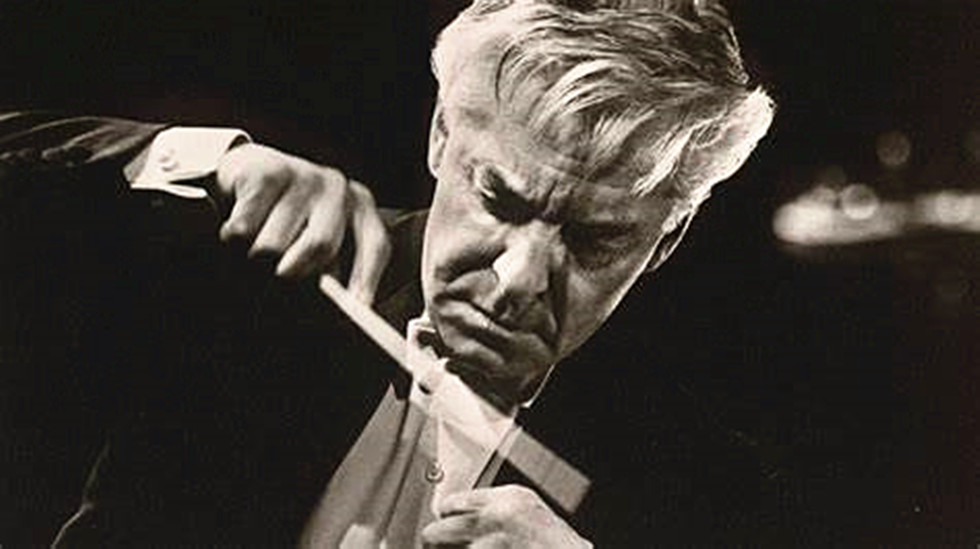 |
|
| |
赫伯特·冯·卡拉扬(Herbert von Karajan)
在指挥中 |
|
|
|
| |
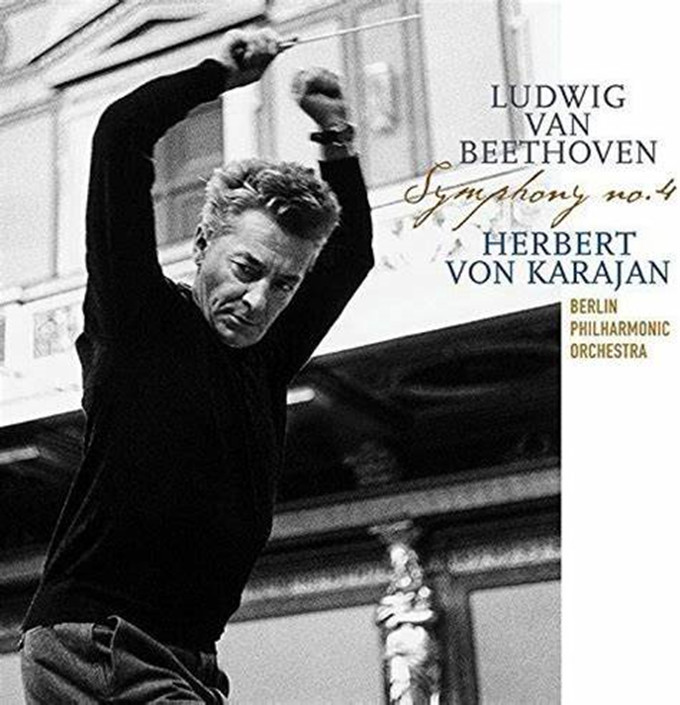 |
|
|
|
| |
赫伯特·冯·卡拉扬(Herbert von Karajan)指挥柏林爱乐演奏《贝多芬第四交响曲》的唱片封面 |
|
|
|
| |
|
|
|
|
| |
是是非非卡拉扬/田润德文 |
|
|
|
| |
美丽富饶的阿尔卑斯山区的鼓声在有力的敲击着,另一支小提琴的乐队也响起来了,但是小提琴的声音终于被铿锵的鼓声给压制的奄奄一息了……
这山区鼓乐的节奏给了卡拉杨幼小的记忆中留下非常深刻的印象。后来对鼓声着迷的卡拉杨,终于走到指挥台上……当1989年奥地利萨尔茨堡夏季音乐节风光欲现,全世界瞩目的焦点就是乐坛翘楚卡拉杨。这是在他的家乡他亲手所创办的音乐节,可谓天时地利人和,人们
都在纷纷翘楚、一睹这位天才的风采。而令世人不可接受的事实竟然出现了――81高龄的世界著名指挥家卡拉杨于音乐节揭幕的前四天1989年7月23日中午不幸溘然长逝,永远和上了他那深邃的双眼,他那在世界乐坛上驰骋了40年之久的富有魅力的双手在胸前静止不动了……从此,卡拉杨现场指挥成为绝版。
卡拉杨的祖籍是土耳其的马其顿(现附属南斯拉夫),1908年4月5日,卡拉扬生于莫扎特的故乡奥地利小城镇萨尔茨堡。据他自己讲他的成功也完全是一种逆反心理造成的,他在他的大家庭中永远是个不受重视的小弟弟,为了让人们看到他的存在,他含辛茹苦的拼命苦学,他也曾是个萨尔茨堡莫扎特音乐学院的神童,但他的成功全靠他自己,因为他的父亲根本不愿意让他一辈子都在钢琴键子上敲敲打打,更想让他学习理工,卡拉杨对理工同样也着迷,并终身对科学有着极大的兴趣,
这才有了他经常开着他的装有高级音响装置的梅塞德-奔驰500汽车兜风、经常开着他的价值100多万,长24米的帆船;以至于开着个人飞机如金鹰般飞跃峡谷,这和
他具有喜欢科技的遗传不无关系。
19岁参加纳粹是他一生的难以解释的污点,尽管上个世纪70年代为此搞的沸沸扬扬满城风雨,但面对这一段经历他致死不悔。用他的话来说当时完全为了生存而不得已而为之,当时一个名叫马尔姆的小剧团要排演《费加罗的婚礼》,需要招聘一
个指挥,卡拉杨闻风而至,这虽然是一个仅有21人的小乐队,他被录用还的有一个条件,就是这一位置必须持有德国的纳粹党党证,面对命运的召唤
,莫扎特召唤,卡拉杨参加了纳粹党支部,领取了一张党证,号码是3430914这张党证他一直保存到1944年,也就是说他当了11年的纳粹党党徒,由于有了党证,他不久就被任命为艾克斯拉沙贝尔市的音乐总指挥,从而成了全德国最年轻的指挥,后来指挥了贝多芬的《英雄交响曲》和瓦格纳《悲伤和孤独》,结果极为成功,在一次指挥柏林交响乐团时也是大获全胜。在此期间,他两次会晤了出席音乐会的大独裁者希特勒,有一次他在指挥《歌唱大师》的演奏会上,他对自己的记忆力深信不疑,因此指挥时连乐谱都不带。不幸的是,第一大提琴手忘记了几个音符,而这一漏洞被希特勒敏感地察觉到了。这位元首在演出之后讥讽地说道:“这个轻浮的奥地利人在指挥瓦格纳的作品时还得带上乐谱。啊,轻浮的奥地利人。”
他指挥的音乐会,多次是以纳粹党歌开始的,在法国被占领期间,他曾为3000德国兵演奏音乐;在巴黎歌剧院还指挥了瓦格纳的《女武神》。对所有这一切卡拉杨是这样解释的:“我之所以加入纳粹党,是因为要当艾克斯拉沙贝尔音乐总指挥就必须具备这个条件,我认为这是我为得到所希望的职位而付出的代价,为达到我的目的我还可能接受其它条件。如果一切重演的话,我也不会改变我的选择。”
今天历史已经翻开了崭新的一页,但回顾总让我们有新的感受,但是无论如何从卡拉杨艺术的巨大成就完全可以遮挡住他这段白壁之暇,听听他指挥柏林爱乐演奏的莫扎特的安魂曲,听听他贝多芬的田园,再看看他一生录制了900张唱片,代表作巴赫《6首勃兰登堡协奏曲》、贝多芬《交响曲全集》、比才《卡门》、勃拉姆斯《交响曲全集》、海顿《12首伦敦交响曲》、瓦格纳《尼伯龙根的指环》等,显示出严整而富有条理,精雕细镂,一丝不苟,均显示了卡拉杨的指挥风格均达到了完美和瑰丽境界,这是一笔多么丰厚的文化遗产啊!想到这些,昔日那些是是非非早已烟消云散。
从历史的角度,客观的角度来看待卡拉杨, 从纯粹为艺术而艺术,为艺术献身的角度来看,卡拉杨还是一个伟大的指挥家。
20031016
田润德/文
(此文曾经发表在古典音乐网站,有删节)
|
|
|
|
| |
|
|
|
|
| |
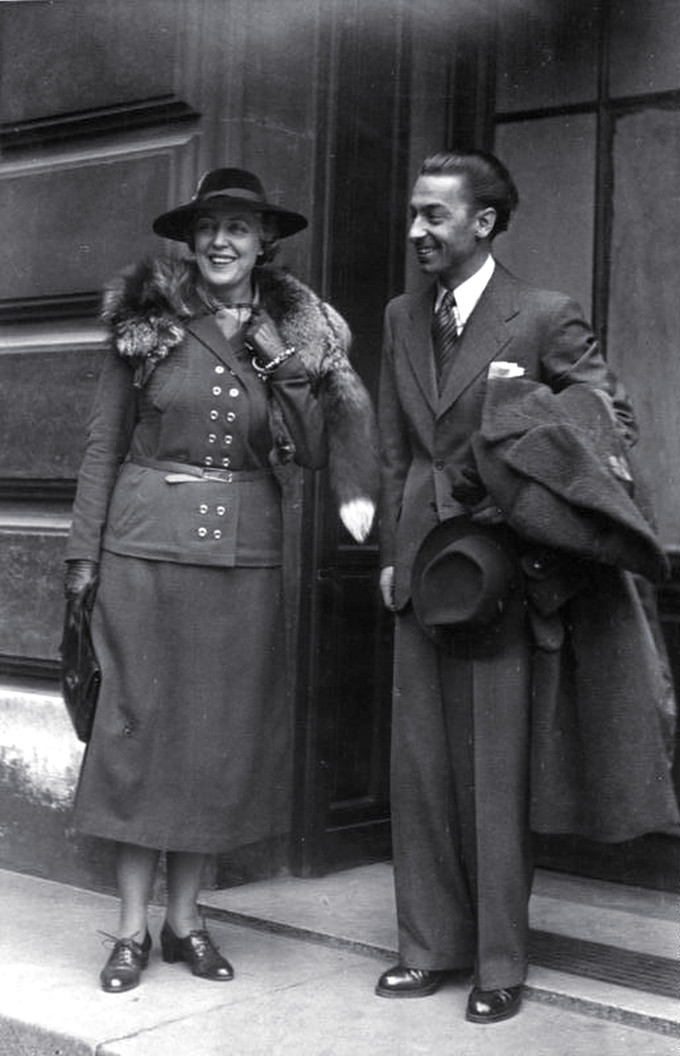 |
|
|
|
| |
赫伯特·卡拉扬和格曼·卢宾女士在巴黎歌剧院的舞台入口处,
(1941年5月17日)[巴黎,Herbert von Karajan和Germaine Lubin]
人物:卡拉扬,赫伯特冯:指挥,维也纳国家歌剧院音乐总监,奥地利. |
|
|
|
| |
Herbert von Karajan und Germaine Lubin Herbert von Karajan und Mme.
Germaine
Lubin vor dem Bühneneingang der Pariser Oper, in der er die Entführung
aus dem Serail
dirigieren wird. (17.5.1941) [Paris, Herbert von Karajan und
Germaine Lubin] Abgebildete
Personen: Karajan, Herbert von: Dirigent, Generalmusikdirektor der
Wiener Staatsoper,
Österreich |
|
|
|
| |
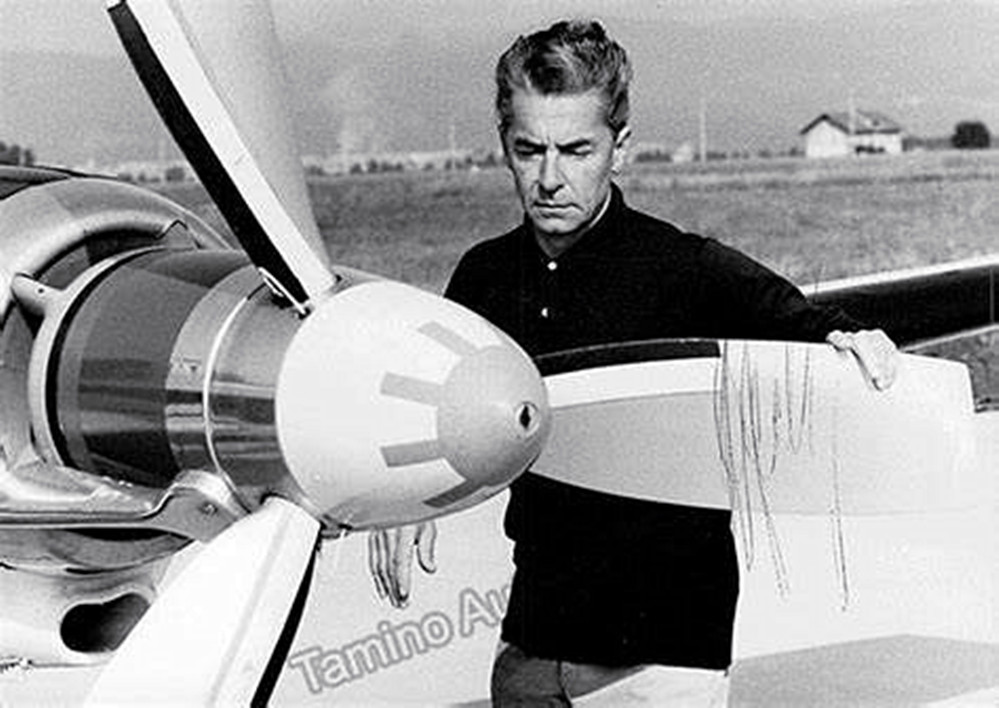 |
|
| |
卡拉扬,赫伯特·冯签名照片
德国著名指挥家(1908-1999),纽约时报在他的讣告中这样描述他:“可能是世界上最著名的指挥家,也是古典音乐中最有影响力的人物之一。”有签名的照片明信片,照片上是他的飞机(他是一个狂热的飞行爱好者)。尺寸为5.75
x 4.1英寸,状态良好。 |
|
|
|
| |
Karajan, Herbert von - Signed
Photo
Star German conductor (1908-1999), New York Times described him in his
obituary as ¨probably the world´s best-known conductor and one of the
most powerful figures in classical music¨. Signed photo postcard, shown
with his plane (he was a big flying enthusiast). Size is 5.75 x 4.1
inches, in excellent condition. |
|
|
|
| |
|
|
|
|
| |
卡拉扬 1972年 德国柏林爱乐乐团 贝多芬第五交响乐
(Beethoven Symphony No.5 命运交响曲)720P高清
|
|
|
|
| |
曲名:
《贝多芬第五交响曲》《命运交响曲》Beethoven Symphony No.5
演奏: 德国国立柏林爱乐乐团
指挥: 赫伯特·冯·卡拉扬(Herbert von Karajan)
拍摄时间: 1972年
介绍: 个人认为是最好、最经典的《命运交响曲》!!! |
|
|
|
| |
|
|
| |
|
|
|
|
| |
未得原作者编者授权严禁转载www.mt77.com任何内容 |
|
|
|
|
|
|
|
|
|
|
|
|
|
|



